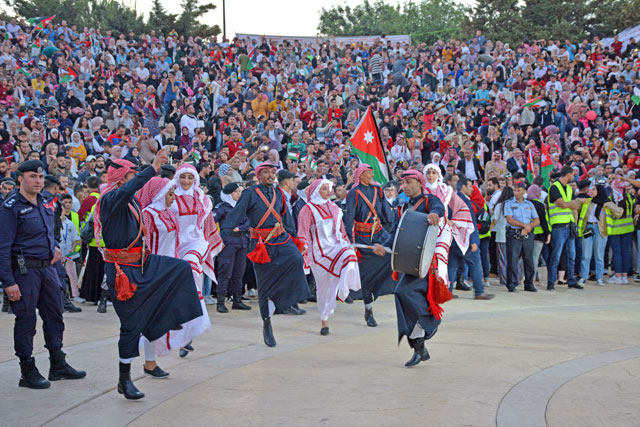AMMAN — Jordan celebrated on Sunday the 20th anniversary of His Majesty King Abdullah’s Accession to the Throne.
The Royal Jordanian Air Force held fly-bys on Sunday to mark the 20th anniversary of His Majesty King Abdullah’s Accession to the Throne. The aircraft flew over the Kingdom’s main cities, and were accompanied by a series of planned activities, the Jordan News Agency, Petra, reported.
Celebrations were held at King Hussein Park and the Roman Theatre in the capital, Amman, as well as at other locations throughout the governorates.
Jordan also celebrates the anniversary of the Great Arab Revolt today, which marks a milestone in the country’s history when the emir of Mecca and the King’s great grandfather, Sharif Hussein Bin Ali, led an uprising against Ottoman rule in the region, which led to the establishment of the modern Kingdom of Jordan, the Jordan News Agency, Petra, reported.
The Jordan Armed Forces-Arab Army were established in Maan, 220km south of Amman, shortly after the founding of the Jordanian state under the name “the Emirate of Transjordan” in 1921.
It comprised of 750 personnel including gendarmerie, infantry and camel cavalry, according to Petra.
The fighters of the 1916 Great Arab Revolt led by Sharif Hussein Ben Ali constituted the nucleus of the force.
Sharif Hussein named this army the Arab Legion. In 1923, Prince Abdullah I gave the same name to the force, according to the Jordan Armed Forces-Arab Army’s website.
The basic military role of the new army was to prevent tribal feuding and protect the independence of the newly established state.
In 1956, His Majesty the late King Hussein dismissed the British Gen. John Glubb as commander of the military and Arab commanders assumed top posts in the army.
As head of Arab nationalists and in alliance with Britain and France, Sharif Hussein had initiated the Great Arab Revolt against Ottoman rule. His sons, Prince Abdullah I and Prince Faisal I, led the Arab forces, with Prince Faisal’s forces liberating Damascus from Ottoman rule in 1918. At the end of the war, Arab forces controlled all of modern Jordan, most of the Arabian Peninsula and much of southern Syria.
According to www.kinghussein.gov.jo, Sharif Hussein’s objective in undertaking the Great Arab Revolt was to establish a single independent and unified Arab state stretching from Aleppo (Syria) to Aden (Yemen), based on the original traditions and culture of the Arab people, while upholding Islamic ideals and the full protection and inclusion of ethnic and religious minorities.
